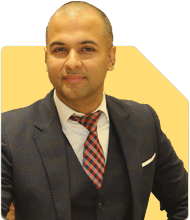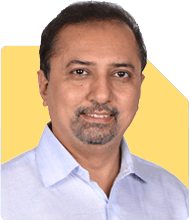Harsh Bharwani | Answer |Ask -Follow
Entrepreneurship Expert - Answered on Jul 04, 2023
As CEO and managing director, he leads the international business and employability initiatives at the computer networking institute, Jetking Infotrain Limited.
After graduating from Delhi University, Bharwani joined the family business in 2010 and set up operations in the US and Vietnam.
He has trained over three lakh students in employability, confidence and key life skills.... more

Hello sir i am sachin nandey and planning about known about the international business model to understand the frame work the marketing and sales and other areas
1. Market Research and Analysis: Before expanding internationally, it's important to conduct thorough market research to identify target markets, understand consumer behavior, assess competition, and evaluate cultural, legal, and economic factors. This analysis will help you determine the viability and potential success of your business in different international markets.
2. Entry Strategy: Once you've identified target markets, you need to determine the most suitable entry strategy. Common approaches include exporting, licensing, franchising, joint ventures, or establishing subsidiaries or local offices. Each strategy has its own benefits and challenges, and the choice depends on factors such as market characteristics, resources, and risk tolerance.
3. Adaptation and Localization: Successful international businesses often adapt their marketing, sales, and product/service offerings to suit local preferences and cultural nuances. This may involve translating materials, adjusting pricing strategies, modifying product features, or tailoring marketing campaigns to resonate with the target market.
4. Distribution and Supply Chain Management: Developing efficient distribution and supply chain networks is crucial for international business success. You need to determine the most effective channels to reach customers, considering factors such as transportation, logistics, warehousing, and customs regulations. Establishing strong relationships with local distributors or partners can help streamline operations.
5. Legal and Regulatory Compliance: International business operations require compliance with various legal and regulatory frameworks. Familiarize yourself with international trade laws, intellectual property rights, tax regulations, import/export restrictions, and any specific regulations related to the countries you plan to operate in. Engage legal and professional advisors to ensure compliance and minimize risks.
6. Cultural Competence: Cultural understanding and sensitivity are vital when conducting business internationally. Learning about cultural norms, values, customs, etiquette, and communication styles can help you build trust and establish strong relationships with international partners, clients, and customers.
7. Marketing and Sales Strategies: Develop marketing and sales strategies that align with the international market's characteristics. This may involve online and offline advertising, digital marketing, social media, trade shows, partnerships with local influencers, and utilizing local sales teams or agents. Customize your strategies to reach and engage your target audience effectively.
Remember, this is a general overview, and the specifics will vary depending on your industry, target markets, and business objectives. It's recommended to conduct thorough research, seek advice from professionals with international business experience, and consider market-specific factors when developing your international business model. Good luck with your exploration of the international business arena!
You may like to see similar questions and answers below
Baqar Iftikhar Naqvi | Answer |Ask -Follow
Start-up Mentor - Answered on Feb 25, 2023
Chandu Nair | Answer |Ask -Follow
VC, Angel Investing, Entrepreneurship Expert - Answered on Feb 12, 2024
Radheshyam Zanwar |6747 Answers |Ask -Follow
MHT-CET, IIT-JEE, NEET-UG Expert - Answered on Dec 16, 2025
Shalini Singh |181 Answers |Ask -Follow
Dating Coach - Answered on Dec 16, 2025
Patrick Dsouza |1429 Answers |Ask -Follow
CAT, XAT, CMAT, CET Expert - Answered on Dec 16, 2025
Nayagam P P |10858 Answers |Ask -Follow
Career Counsellor - Answered on Dec 16, 2025
Nayagam P P |10858 Answers |Ask -Follow
Career Counsellor - Answered on Dec 16, 2025
Samraat Jadhav |2510 Answers |Ask -Follow
Stock Market Expert - Answered on Dec 16, 2025
Samraat Jadhav |2510 Answers |Ask -Follow
Stock Market Expert - Answered on Dec 16, 2025
Nayagam P P |10858 Answers |Ask -Follow
Career Counsellor - Answered on Dec 16, 2025
Nayagam P P |10858 Answers |Ask -Follow
Career Counsellor - Answered on Dec 16, 2025
Ramalingam Kalirajan |10894 Answers |Ask -Follow
Mutual Funds, Financial Planning Expert - Answered on Dec 16, 2025



























